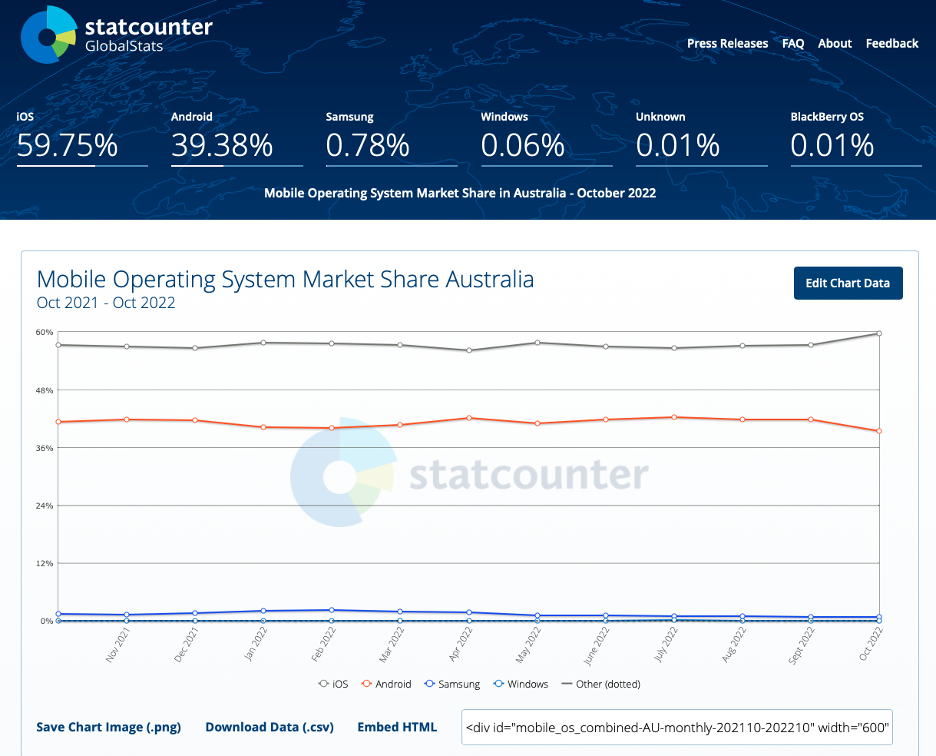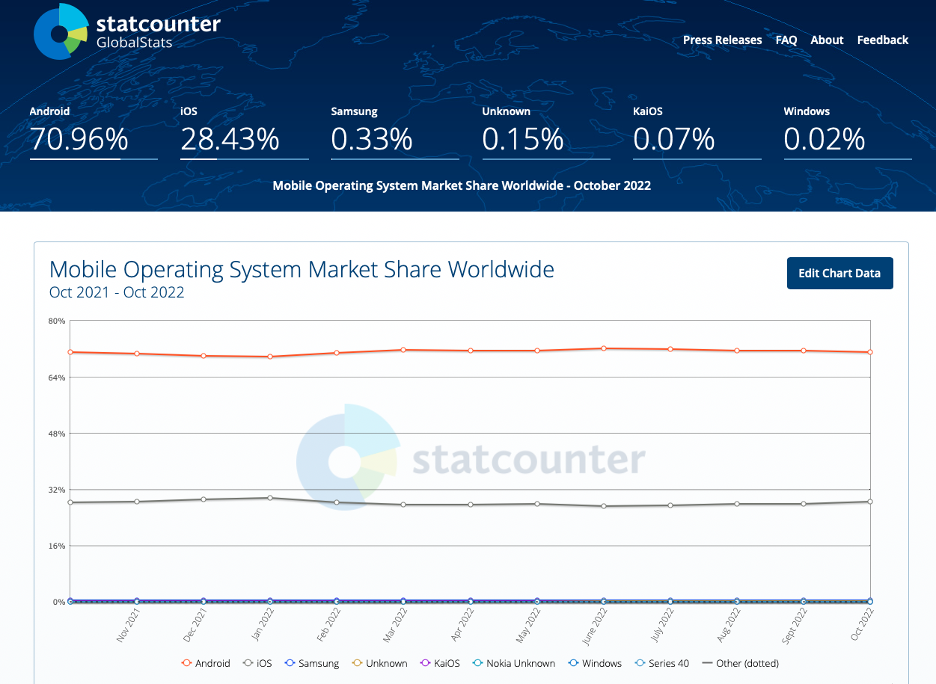Apple’s iOS is now the King of Australia
If you live in Australia, you probably know someone who owns an iPhone – there’s a good chance you own one yourself. That’s because Apple’s flagship devices are Australia’s most popular mobile phones.
New research by Statcounter indicates that iOS, the iPhone’s operating system, captured 59.75 per cent of Australia’s mobile perating system market between October 2021 – October 2022. Android, once having the majority share, has now slipped to a mere 39.38 per cent of the market.

Apple’s iOS now holds 59.75 per cent of Australia’s mobile operating system market. source
But does a more significant market share guarantee that iOS is better than Android? Not exactly. Determining which operating system is best depends on your needs and other factors.
In this post, we’ll outline some core areas where iOS clearly dominates Android so you can decide if an iPhone is the best option for you. Read on to find out.
What is a mobile operating system?
First, let’s explain what an Operating System (OS) is. An OS is software that powers a device. In other words, operation systems are not limited to phones – your laptop, desktop, smart TV, etc., all function thanks to their OS.
While your device is packed with many specs and designs that make it move smoothly and look pretty, it would simply be a lump of plastic if it didn’t have any operating system.
The same applies to your mobile phone, whether it’s an iPhone, Samsung, or any other phone. What’s different, though, is that phones use mobile operating systems tailored to smaller devices. The two most popular mobile operating systems today are iOS and Android:
- iOS
Apple’s unique mobile operating system is iOS, which is unique to Apple devices. The OS has evolved over the years with newer versions launched annually, so newer iPhones like the iPhone 14 series use a different iOS version than, for instance, iPhone 6. - Android
Android is an OS used by other phone manufacturers besides Apple. There are other operating systems, but Android is the choice of the bulk of phone manufacturers.
So how is iOS better than Android?
Apple has made strides in the mobile phone market, known for its unique designs and operating system. The company’s marketing department is brilliant – so much so that each new iPhone series commands significant attention from consumers and media every year.
Recall that iOS now holds Australia’s largest mobile operating system market share. However, more is needed to prove that iOS is better than Android because Android still dominates on a global stage, holding a whopping 70.96 per cent share of the global mobile operating system market. Android backs an Open Signal report indicating that around 1,300 brands use the Android OS to operate over 24,000 devices.

While iOS holds the largest mobile OS market share in Australia, Android dominates on the world stage with a 70.9 per cent market share. source
So while the lure of owning an Apple iPhone is real in Australia, that is only credited to their marketing prowess. What determines how iOS is better than Android are other factors that focus on functionality and uniqueness.
Here’s a look at three areas where iOS is better than Android:
- Security and privacy
Security and privacy are paramount if you’re in the digital space. While your phone is an excellent gadget for connecting to the world, it is also a tool that could be used to gain access to your personal information. Australians should be familiar with the importance of security after this year’s recent Optus data breach, which exposed the personal data of around 10 million Australians. Thankfully, Apple’s iOS outshines all other operating systems regarding security and privacy. Apple iPhones are known for their powerful encryption to protect data. Frequent OS and app updates are sent directly to your phone without interference from third parties like your telco. Yes, Apple collects your user data for analysis to improve products, but the data is anonymous. According to recent Vanderbilt research, Android, on the other hand, collects large amounts of data regardless of your phone usage. - Long-term value
We mentioned how brilliant Apple’s marketing department must be to create a prestigious lure about its devices. Whenever an iPhone launch is approaching, it takes over headlines for months. Many join long queues to be the first to own the latest iPhone, even when they already own a model from the year before. This lure gives your iOS-operated iPhone long-term resell value. And what’s more, Apple offers free software updates for many years, which gives your device even more resell value. For instance, an iPhone 7 still commands a decent price tag even though it was launched over five years ago. A 5-year-old Android-operated device, however, will be worth very little. - After-sales support
In many cases, after you purchase a phone, you are on your own. If you face any issues, you’ll have to figure it out yourself or turn to resources on websites like WhatPhone. On the other hand, Apple offers customer support to iOS device owners after sales. To get help, you can turn to their dedicated support app or website or book a face-to-face appointment at an Apple Store.
Final words
When choosing the suitable device for your needs, consider a phone that gives you the ultimate security, long-term resale value, and after-sales customer support. This is especially important in this digital age, where your data is vulnerable to the most inexperienced fraudsters. Thankfully, iOS devices give you all of these factors and more, so you can enjoy all the inclusions in your SIM plan without much safety concern.